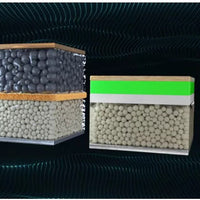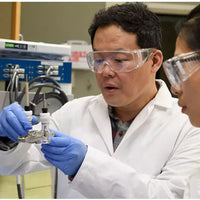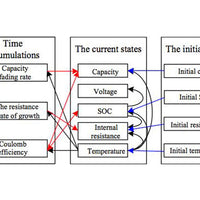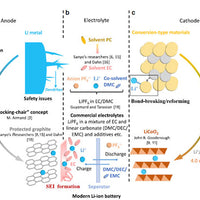As the core raw material of power batteries, "lithium" has the reputation as "white oil", and is an indispensable element for the development of energy storage and new energy vehicles, the important position is comparable to the oil of the electrical era. Industry analysis believes that, as oil opened the fossil energy era, lithium batteries may lead the new energy revolution.
So, lithium batteries can replace oil?
Strategic value comparable to oil
The reason why lithium batteries are compared with oil is ultimately due to the contrast between new energy vehicles and traditional fuel vehicles.
Currently, under the wave of global carbon neutrality, the new energy vehicle industry has seen explosive growth, and some traditional car companies have stopped producing fuel cars one after another. According to CCA data, in the first half of this year, new energy vehicle sales increased year-on-year for six consecutive months, and even in the overall decline of the domestic car market in March-May, new energy vehicle sales still achieved a significant increase of 114.1%, 44.6%, and 105.2%, respectively.
"Environmental protection and other factors have made the development trend of new energy as well as new energy vehicles irreversible, and the competition among major countries and regions in many strategic emerging areas is bound to intensify." In the view of Cao Guangping, an independent researcher on new energy and smart networked vehicles, lithium batteries can replace the current position of oil in some areas in the future. "Although the bulk raw material status of petroleum remains irreplaceable in chemical, pharmaceutical, and various light and heavy industries, lithium batteries can bring in other green electrical energy as a means of energy storage in the transportation field."
As more and more countries accelerate the development of new energy vehicles, car companies and manufacturers of lithium demand is getting higher and higher, a no-smoke "white oil scramble" quietly unfolded, and lithium resource supply shortage also triggered the sales price has been soaring. From the beginning of this year to the end of June, the average spot price of domestic battery-grade lithium carbonate rose from the initial 278,000 yuan/ton to 469,000 yuan/ton.
Some industry insiders say, that master lithium resources, mastered the round of new energy vehicle development lifeline, the future of the global "war" for lithium battery resources will become more intense.
China dominates global supply chains
At present, it seems that China is undoubtedly the biggest winner in the global lithium battery market. According to research firm Bloomberg NEF, China's share of the lithium-ion battery market may now be as high as 80 percent. Six of the world's top 10 electric vehicle battery manufacturers are located in China, and three out of every 10 electric vehicle batteries in the world are produced by CATL, an advantage that extends to the entire supply chain.
CATL Chairman Zeng Yuqun previously said the company is in talks with all mainstream overseas car companies on how to land services due to localized production needs. "Overseas customers want the company to increase the supply ratio and become their top supplier starting from the next fixed-point cycle, i.e. after 2026, or even by 2035."
"China's high foreign dependence on oil, through a complete battery industry chain, vigorously develop new energy vehicles, which will help to reduce oil imports year by year, is significant for further enhancing China's energy security, which is also a strategic goal of China's vigorous development of new energy vehicles." Zhang Xiang, director of the New Energy Vehicle Technology Research Institute of Jiangxi New Energy Technology Vocational College, pointed out.
With lithium batteries, Chinese companies are rapidly occupying the European and American markets and dominating the global lithium battery supply chain. Many countries have also tried to gain more market share in the lithium-ion battery supply chain. According to the U.S. Department of Energy, there will be 13 new battery super factories coming online in the U.S. by 2025. Another forecast indicates that Europe may add 35 new super factories for processing lithium resources or producing lithium-ion batteries by 2035.
"However, the way China's lithium battery resources are utilized needs to be further enhanced." Cao Guangping reminded me, lithium battery resources can be "recycled or low-cost utilization" and is related to the life and death of pure electric vehicle technology route, the development of new highly comprehensive efficiency battery material system technology is particularly important.
"Lithium resource crisis" is unlikely
So, with the surge in demand for lithium batteries, if the supply of lithium batteries can not be self-sufficient, will there be a "lithium battery crisis" in the future?
"The degree of lithium resource crisis and the depth of impact will not exceed that of oil." Cao Guangping said, "lithium battery material recovery and recycling in technology has no obstacles. In addition, the distribution of lithium resources is different from oil, and the content is very rich in the oceans around the world, and there may still be greater development of low-cost seawater lithium extraction technology in the future."
"Lithium batteries will continue to usher in technological changes in the future. For example, sodium-ion batteries, fuel cells, and other technical routes to maturity may gradually reduce the demand for lithium elements and the number of batteries, or even take the place of lithium-ion batteries. And oil as fossil energy is unable to change. Therefore, the possibility of a 'lithium battery crisis' is very small." Zhang Xiang said.
However, the traditional gasoline engine, although is being phased out, this year's Russia-Ukraine conflict still put the world's dependence on fossil fuels fully exposed. In the industry's view, although the carbon-neutral background, lithium batteries have the potential to replace nearly 100 years of oil in the energy sector, the world is still dependent on oil, and the future of battery technology has a huge potential for development and progress.
"To protect China's energy supply and low-carbon development, strategic emerging industries cannot be developed for the sake of development, and even more so, they should not be developed in a big way just for the sake of benefits, but should be developed in a synergistic and in-depth way in terms of application and technology." Cao Guangping pointed out.







0 comments